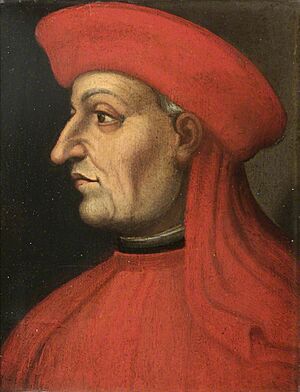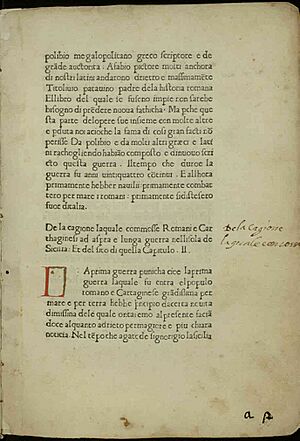Leonardo Bruni facts for kids
Leonardo Bruni (born around 1370, died 1444) was an important Italian thinker, historian, and leader during the early Renaissance. He is often called the first modern historian. Bruni was one of the first to divide history into three main parts: Ancient Times, the Middle Ages, and Modern Times. Even though his exact dates for these periods are different from what we use today, he helped us think about history in this way.
Bruni's Life Story
Leonardo Bruni was born in Arezzo, a town in Tuscany, Italy, around 1370. He studied under a famous political and cultural leader named Coluccio Salutati. Bruni later took over Salutati's important job as the Chancellor of Florence. This was a very high political position.
Bruni also worked for several popes as an "apostolic secretary" from 1405 to 1414. He served as Chancellor of Florence for many years, from 1410 to 1411 and again from 1427 until he died in 1444. During these times, Florence often faced wars. Even though he held a top job, powerful families like the Medici and Albizzi often had more real power than Bruni.
Bruni passed away in Florence in 1444. Another scholar, Carlo Marsuppini, took his place as Chancellor.
Why Bruni Was Important
One of Bruni's most famous books is History of the Florentine People, 12 Books. Many people consider this to be the first truly modern history book. Bruni's idea of dividing history into three periods helped make history more about human events, rather than just religious ones. This is why he is called the first modern historian.
The idea for this three-part view came from an earlier scholar named Petrarch. Petrarch saw a clear difference between the classical period (Ancient Times) and the "darkness" of later times. Bruni believed that Italy was experiencing a rebirth, which meant it was entering a new, brighter age.
Key Works and Ideas
Bruni wrote a famous biography called New Cicero, which was about the Roman statesman Cicero. He also wrote biographies in Italian about famous writers like Dante and Petrarch. Bruni was the one who used the phrase studia humanitatis. This phrase means the study of human efforts and achievements, separate from religious studies. This is where the word "humanists" comes from.
As a humanist, Bruni was very important for translating many Greek philosophy and history books into Latin. He translated works by famous thinkers like Aristotle and Procopius. His translations of Aristotle's Politics and Nicomachean Ethics were widely read. Bruni also wrote a short book in Greek about the government of Florence.
Bruni died in Florence in 1444. He is buried in a beautiful tomb created by Bernardo Rossellino in the Basilica of Santa Croce, Florence.
Works
Bruni wrote many important texts during his lifetime. These works helped shape how people thought about history and humanism during the Renaissance.
 | Madam C. J. Walker |
 | Janet Emerson Bashen |
 | Annie Turnbo Malone |
 | Maggie L. Walker |



